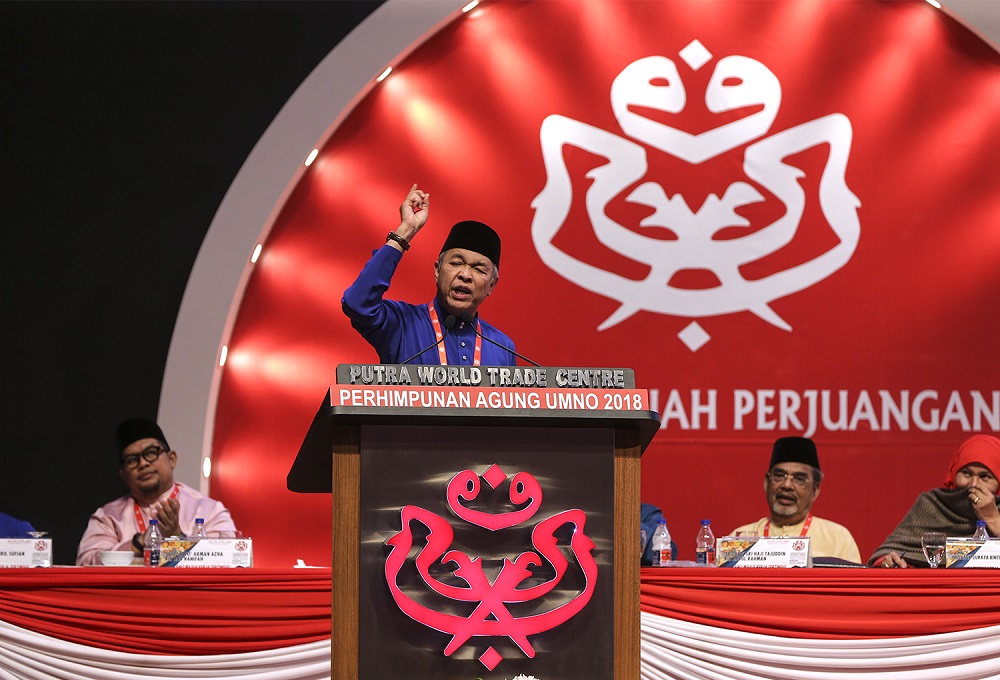KUALA LUMPUR, Oct 1 — Over the weekend, the country’s oldest party Umno marked an epoch in its political history when it convened for its annual general assembly for the first time as Opposition since Merdeka.
Since the shock defeat at the May 9 general election, the months leading to the three-day congress had been tumultuous for the Barisan Nasional lynchpin.
It saw former president Datuk Seri Najib Razak arrested and charged with a spate of money laundering and graft offences. Several key veterans quit on top of defections that happened immediately after Umno fell.
But perhaps the most devastating of all was the seizure of cash said to party funds amounting to billions in ringgit from Najib’s properties. Umno may be a stalwart in dealing with a political crisis, but only because the money kept flowing.
So the 2018 AGM was most of all a platform for Umno’s leadership to show strength and confidence in trying times.
These are three key takeaways from this year’s Umno AGM:
Zahid Hamidi has a plan (it seems)... but it’s confusing
New president Datuk Seri Ahmad Zahid Hamidi has been entrusted to rebuild a demoralised party upon succeeding Najib, whose legacy encapsulates what Umno is perceived to be today — blind, corrupt and arrogant.
Opening this year’s AGM, Zahid outlined 21 strategies in a policy speech meant to act as the definitive action plan for Umno’s revival, but most of it were lost in translation.
Zahid gave inconsistent and contradictory directions. At one point he said no to a unity pact with Pakatan Harapan or even PAS, but in his speech he pushed for “consolidation for an Opposition bloc” that included the Islamists, which was clearly implied even if he refrained from mentioning the party’s name.
To make it worse, he gave long-winded speeches, which most of the time, sounded more like a showcase of his own intellect than a serious call to digest the action plan he just outlined.
This was evident when for most his speech, the audience responded only when he spoke simply about unity or chest-thumping statements to criticism about the lack of clarity in his strategies, and not so much about the strategies proper.
Voice of reform heard, but not loud enough
Political analysts may be disappointed to know that the attempt to use Umno’s first congress out of power as an opportunity for self-cleansing gained little traction.
Yes, there were delegates who hit out at the practice of patronage and corruption within the party, or spoke out against Umno’s racism.
Deputy president Datuk Seri Mohamad Hasan was the highest ranking Umno leader to lambast the entrenched political culture that helped nurture corrupt powerful warlords, leaving the party’s integrity weakened and alienating supporters.
But the reformists numbered only a handful. If observers felt Umno should have taken this opportunity to change, the sentiment expressed by the majority of delegates at the debates showed it was business as usual.
Instead, most chose to go down that same path of vilifying leaders who left the party; heaping praises about its own achievements or ranting about the new Pakatan Harapan (PH) government’s unfulfilled election pledges.
The fact that most delegates either ignored or were unaware that voters care less about PH’s election manifesto than overthrowing a corrupt Umno only reinforced views that the party is out of touch with voters and is delusional.
And Umno will likely remain the same for some time to come, judging from the views expressed at the debates.
Cash is (still) king
With patronage running deep in Umno, it was no surprised that money was an important point repeatedly raised either in the congress or Umno delegates and loyal warlord followers occupying the hallways of the Putra World Trade Centre.
The fact that recouping money and liquidating assets were among the first issues Zahid touched on in his winding-up speech spoke volume about what the party prioritises.
This will come as a major disappointment to members who expected the party leadership to repent and return to simpler times when championing the many poor Malays was the core struggle.
Unfortunately for most of Umno’s three million members who tend to be on the lower income side, “returning to the core struggle” became nothing but a passing mention without any clear outline as to what it is.
While the remaining part of the congress, the closest delegates ever came to a concrete “plan” was to continue with the party’s anti-PH propaganda.
If the sizeable decrease in attendance at this year’s AGM was any measure, Umno grassroots appeared hardly impressed.



















